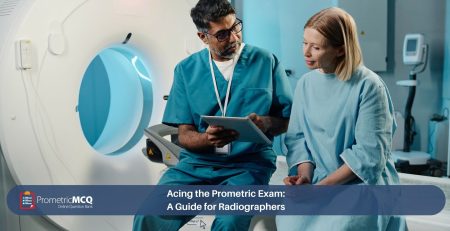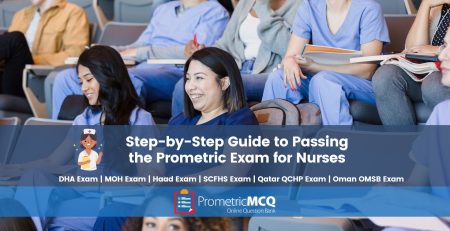
Top Prometric Exam Study Tips for Healthcare Workers
fatima@prometricmcq.com2025-09-24T16:36:30+00:00Table of Contents
ToggleTop Prometric Exam Study Tips for Healthcare Workers (2025)
For healthcare professionals across the globe, the Prometric exam is a universal symbol of a high-stakes challenge. Whether it’s the DHA in Dubai, the MOH in the UAE, the SCFHS in Saudi Arabia, the QCHP in Qatar, or the NHRA in Bahrain, these licensing exams are the critical gateway to practicing in some of the world’s most advanced healthcare systems. The pressure is immense, the syllabus is vast, and the path to success can often seem unclear. While the specific clinical knowledge varies by profession and country, the core skills required to pass are remarkably consistent.
The truth about these exams is that clinical knowledge alone is not enough. The highest-scoring candidates are not necessarily those who have memorized the most facts, but those who have mastered a strategic, efficient, and resilient approach to their preparation. They understand that these exams are designed to test clinical reasoning, critical thinking, and performance under pressure. They study smarter, not just harder.
This ultimate 2025 guide distills the most effective, universally applicable study tips for any healthcare worker preparing for a Prometric exam. We will move beyond generic advice and provide a deep, actionable framework that covers everything from creating a winning study plan to mastering MCQ-based learning and cultivating the right mindset. Supported by a comprehensive 10-point FAQ section, this guide is your definitive roadmap to conquering your licensing exam and launching the next successful chapter of your career.
Key Takeaways for Prometric Exam Success
- Active Over Passive: Your study time must be dominated by active learning (solving MCQs), not passive learning (reading or watching videos).
- Strategy is Everything: A structured, realistic study schedule focused on high-yield topics is non-negotiable.
- Master the Rationale: The real learning from a question bank happens when you deeply analyze the explanation for every option, not just the correct one.
- Simulate to Succeed: Regular, full-length, timed mock exams are the only way to build the mental stamina and pacing skills required to pass.
- Well-being is Not a Luxury: Burnout is the enemy of success. Prioritizing sleep, nutrition, and breaks is essential for peak cognitive performance.
The Universal Framework: 9 Study Tips for Any Prometric Exam
These nine tips form a strategic foundation that can be adapted for any healthcare specialty, from general practice doctors to specialist nurses, pharmacists, dentists, and allied health professionals.
Tip #1: Commit to Active Recall from Day One
The most common mistake candidates make is spending months passively reading textbooks. While this feels productive, it’s highly inefficient for long-term retention. The Prometric exam requires you to actively retrieve and apply information. The best way to train this skill is through active recall. From the very beginning, your study sessions should be centered around solving questions from a high-quality question bank (QBank). This forces your brain to work, building stronger neural connections than passive reading ever could.
Tip #2: Build a Structured, High-Yield Study Plan
The syllabus for any medical exam is vast; you cannot master everything. Instead of studying randomly, create a structured, subject-based schedule. Identify the high-yield domains for your specific exam (e.g., Internal Medicine for the SMLE exam, Patient Safety for nursing exams). Allocate specific weeks to each domain. A typical block might involve 2-3 days of focused content review followed by 4-5 days of intensive MCQ solving for that topic. This provides structure and ensures you cover all critical areas.
Tip #3: Treat Your QBank as Your Primary Textbook
A high-quality QBank is more than a set of questions; it’s an interactive textbook. The most profound learning happens in the rationales. For every question, you must force yourself to:
- Understand why the correct answer is correct.
- Understand why each of the incorrect options (distractors) is wrong.
- Connect the concept to a broader clinical principle.
This deep analysis is what separates passing candidates from failing ones. It trains you to think critically and differentiate between closely related concepts, a key skill for a tough MCQ exam. For an idea of what to look for, you can see how different question banks are categorized in our MCQs Packages.
Tip #4: Deconstruct the Clinical Vignette
Prometric questions are almost always case-based. Train yourself to read them strategically. First, read the last sentence—the actual question—to know what you’re looking for (e.g., “What is the most likely diagnosis?” vs. “What is the next best step?”). Then, go back and read the vignette, actively highlighting keywords: age, gender, chief complaint, duration of symptoms, key physical exam findings, and critical lab values. This structured approach prevents you from getting lost in the details and helps you focus on the most relevant information.
Tip #5: Perfect Your Pacing with Timed Mock Exams
Mental fatigue is real. A 3-hour, 150-question exam is a marathon. You must train for it. Starting at least 6-8 weeks before your test date, begin taking regular full-length, timed mock exams. This builds your stamina, helps you find a rhythm, and perfects your time management. Aim to spend about one minute per question, allowing you to flag difficult questions and return to them later. Walking into the Prometric center with a tested pacing strategy dramatically reduces anxiety.
Tip #6: Consolidate Knowledge with Spaced Repetition
Forgetting is a natural part of learning. To combat this, use spaced repetition. After you complete a subject block (e.g., Cardiology), don’t just forget about it. Create a system to briefly review the key concepts a few days later, then a week later, then a few weeks later. This can be done by re-doing incorrect questions from that block or reviewing summary notes. This technique is scientifically proven to enhance long-term memory and is a cornerstone of effective learning, as advocated by many educational psychology resources like those from the American Psychological Association (APA).
Tip #7: Prioritize Your Physical and Mental Well-being
You cannot perform at your cognitive peak if you are exhausted. Burnout is the number one enemy of a successful study campaign. You must schedule breaks, get 7-8 hours of quality sleep per night, eat nutritious meals, and incorporate at least 30 minutes of physical activity into your day. A rested, healthy mind is more efficient, resilient, and capable of complex problem-solving. This is not a luxury; it’s a core part of an effective study plan.
Tip #8: Choose Quality Over Quantity in Your Study Resources
Avoid the trap of “resource overload.” Trying to study from five different textbooks and multiple free, unverified online sources will lead to confusion and overwhelm. Instead, be selective. Choose one high-quality, up-to-date core textbook for your profession and, most importantly, invest in one comprehensive, reputable, and regularly updated QBank. Master these two resources rather than skimming through dozens.
Tip #9: Plan Your Exam Day Logistics in Advance
Do not let easily avoidable stress derail your performance on exam day. Weeks before your test, confirm the location of your Prometric center and plan your transportation. The day before, prepare everything you need: your original valid passport (ensure the name matches your application exactly) and your appointment confirmation. Arrive at the test center at least 30-45 minutes early to allow for check-in without rushing.
Frequently Asked Questions (FAQs) for Prometric Exam Takers
While the official result is always Pass/Fail, the widely accepted unofficial passing benchmark for most healthcare professions (doctors, nurses, pharmacists, etc.) across the various Gulf health authorities is between 60% and 65%. To be safe, your goal should be to consistently score above 70-75% on your mock exams.
The ideal preparation time varies, but a structured plan of 3 to 4 months is recommended for most candidates. This allows for a comprehensive content review followed by an intensive period of MCQ practice and mock exams without leading to burnout.
No, none of the major Gulf healthcare licensing exams (DHA, MOH, SCFHS, QCHP, NHRA) use negative marking. Your score is based solely on the number of questions you answer correctly. Therefore, you must answer every single question, even if it’s a guess.
Use the process of elimination. Even with limited knowledge, you can often identify one or two distractor options that are clearly incorrect. This significantly increases your odds of guessing correctly from the remaining choices. Make your best-educated guess, flag the question, and move on.
A high-quality, comprehensive question bank (QBank) that is specific to your exam and profession is universally considered the single most effective study tool. It facilitates the active recall and clinical reasoning skills that are essential for passing. Effective Prometric exam preparation is built on this foundation.
Most health authorities in the Gulf region allow a candidate three attempts to pass their licensing exam. After a third failure, there are usually additional requirements, such as a waiting period or a mandate for further training, before you can re-apply.
The best way to manage anxiety is through thorough preparation and simulation. The more full-length mock exams you take, the more familiar and less intimidating the real test will feel. Additionally, practicing mindfulness or deep-breathing exercises can be very effective. On exam day, trust in your preparation.
No, it is highly counterproductive. Cramming increases anxiety and fatigue while providing very little long-term retention. The last 1-2 days before your exam should be dedicated to light review and, most importantly, rest and relaxation to ensure your brain is at its best.
PSV is a mandatory background check of your credentials that is separate from the exam but required for your license. It’s a process where your educational and professional documents are verified at their source. It is advisable to start this process concurrently with your exam preparation to avoid licensing delays.
Because the rationales are where the deepest learning happens. They don’t just tell you the right answer; they teach you the clinical principle behind the question. By understanding why the wrong options are wrong, you learn to spot subtle differences and build the sophisticated clinical judgment that the exam is designed to test.
Conclusion: A Universal Strategy for Success
The Prometric licensing exam is a significant hurdle, but it is a predictable one. It rewards not just knowledge, but discipline, strategy, and resilience. By adopting these universal study tips—committing to active, question-based learning, following a structured plan, and prioritizing your well-being—you can build a preparation campaign that is both efficient and effective. Master this process, and you will be fully prepared to conquer your exam and take the next exciting step in your healthcare career.
Ready to Transform Your Study Strategy into a Passing Score?
Our comprehensive MCQ packages are designed for all major healthcare professions and Gulf authorities, providing the active learning framework, high-yield questions, and realistic simulations you need to pass with confidence.










